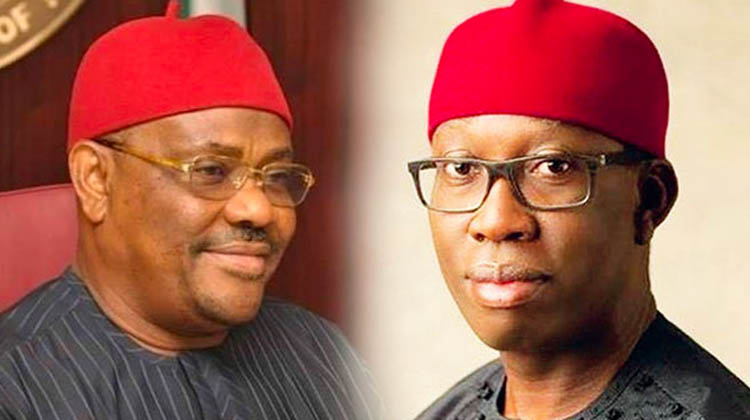Nyesom Wike, the Minister of the Federal Capital Territory (FCT), has commended former Delta State Governor and 2023 Peoples Democratic Party (PDP) vice-presidential candidate, Ifeanyi Okowa, for defecting to the All Progressives Congress (APC). Wike characterized the move as a shrewd political maneuver, highlighting Okowa’s foresight and courage to align with the prevailing political tide. He expressed astonishment at the PDP’s apparent failure to anticipate Okowa’s departure, emphasizing the former governor’s reputation as a calculated and experienced political operator. Wike’s comments, delivered during a monthly media parley in Abuja, underscored the growing fissures within the PDP and the shifting political landscape in the lead-up to the 2027 elections. His pointed remarks also served to further solidify his position as a vocal critic of his former party’s leadership and internal dynamics.
Wike’s defense of Okowa’s defection centered on the argument that Okowa’s open support for President Tinubu was a more principled stance compared to the perceived hypocrisy of other PDP members. He specifically cited the example of the PDP Board of Trustees Chairman endorsing Alex Otti, a Labour Party governor, for re-election, while simultaneously remaining within the PDP. This, according to Wike, represented a double standard that Okowa refused to participate in. He portrayed Okowa’s decision as a conscious choice for transparency over political maneuvering, a move that Wike believes reflects Okowa’s astute political acumen. The FCT Minister framed Okowa’s defection as an act of political honesty in contrast to the duplicity he perceives within the PDP’s ranks.
The FCT Minister’s comments highlight a broader narrative of internal conflict and strategic realignments within the PDP. Wike’s repeated criticisms of the party leadership suggest deeper issues of cohesion and direction. By praising Okowa’s defection, Wike implicitly criticizes the PDP’s inability to retain its key members and adapt to the changing political environment. He questioned the party’s leadership, suggesting that their failure to recognize and address internal dissent contributed to Okowa’s departure. This public display of disapproval further fuels speculation about Wike’s own future within the PDP and the potential for further realignments within the Nigerian political landscape.
Wike’s public pronouncements serve as a potent commentary on the state of the PDP. His words not only offer insights into the internal dynamics of the party but also reflect the broader political currents within Nigeria. Okowa’s defection, as interpreted by Wike, is not merely an isolated incident but a symptom of deeper malaise within the PDP. This event, coupled with Wike’s ongoing critique, paints a picture of a party grappling with internal divisions and struggling to maintain its relevance in a dynamic political environment. The upcoming 2027 elections loom large, and the PDP’s ability to navigate these internal challenges will significantly impact its electoral prospects.
The implications of Okowa’s defection extend beyond the immediate political maneuvering. It signifies a potential shift in the balance of power within the Nigerian political scene. The move could bolster the APC’s influence while further weakening the opposition. Wike’s endorsement of Okowa’s decision adds another layer of complexity to the situation, highlighting the existing rifts within the PDP and potentially influencing the decisions of other party members. As the 2027 elections draw closer, such realignments could significantly reshape the political landscape and influence the trajectory of Nigerian politics.
The ongoing political drama involving Wike, Okowa, and the PDP serves as a microcosm of the broader political dynamics at play in Nigeria. It underscores the fluid nature of political allegiances, the importance of strategic maneuvering, and the constant jostling for power. The events surrounding Okowa’s defection and Wike’s subsequent commentary provide valuable insights into the evolving political landscape. They offer a glimpse into the calculations and considerations of key political figures and highlight the challenges faced by political parties in navigating the complex and often unpredictable terrain of Nigerian politics. The upcoming 2027 elections promise to be a pivotal moment, and the unfolding events within the PDP, as highlighted by the Okowa defection, will undoubtedly play a significant role in shaping the outcome.


